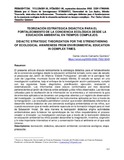| dc.rights.license | http://creativecommons.org/licenses/by-nc-sa/3.0/ve/ | es_VE |
| dc.contributor.author | Camacho Quintero, Carlos Liborio | |
| dc.date.accessioned | 2023-07-27T13:21:09Z | |
| dc.date.available | 2023-07-27T13:21:09Z | |
| dc.date.issued | 2023-07-27 | |
| dc.identifier.issn | 0798-3069 | |
| dc.identifier.uri | http://www.saber.ula.ve/handle/123456789/49735 | |
| dc.description.abstract | El presente artículo discute teóricamente la estrategia didáctica para el fortalecimiento
de la conciencia ecológica desde la educación ambiental tomado como caso de estudio el preescolar
del Jardín de Infancia “Estado Portuguesa”, ubicado en la parroquia San Juan de Lagunillas,
municipio Sucre del estado Mérida. El estudio se apoyó en una investigación cualitativa, bajo
el enfoque de la investigación acción participante, cumplió con las siguientes fases: diagnóstico,
planificación, ejecución, evaluación y sistematización. Los informantes clave estuvo conformados por
tres docentes pertenecientes al jardín de infancia antes señalado y diez niños observados. Las
técnicas utilizadas para la recolección de la información es la entrevista y el instrumento la
guía de entrevista aplicada a los docentes con preguntas abiertas y un registro de observación
del investigador. La validez y fiabilidad en los instrumentos aplicados se hizo a través de la
triangulación. Los resultados permitieron concluir que existen debilidades referentes al desarrollo
teórico didáctico de una conciencia ecológica ambientalista en los niños, aun cuando reconocen que
el medio ambiente repercute en la formación integral para el nivel de Educación Inicial. De esta manera
la teorización didáctica origino actividades ambientalistas para fortalecer los aprendizajes de los niños
respetándoles el proceso creador e innovador. La investigación concluye que a través de la teorización
didáctica en educación ambiental los niños pueden desarrollar la imaginación, inventiva, cognición y lo más
importante internalizar el amor y conservación hacia el ambiente en el que está inmerso. | es_VE |
| dc.language.iso | es | es_VE |
| dc.publisher | SaberULA | es_VE |
| dc.rights | info:eu-repo/semantics/openAccess | es_VE |
| dc.subject | Teorización | es_VE |
| dc.subject | Didáctica | es_VE |
| dc.subject | Educación ambiental | es_VE |
| dc.subject | Conciencia ecológica | es_VE |
| dc.subject | Etapa preescolar | es_VE |
| dc.title | Teorización estrátegica didáctica para el fortalecimiento de la conciencia ecológica desde la educación ambiental en tiempos complejos | es_VE |
| dc.title.alternative | Didactic strategic theorization for the strengthening of ecological awareness from environmental education in complex times | es_VE |
| dc.type | info:eu-repo/semantics/article | es_VE |
| dc.description.abstract1 | This article theoretically discusses the didactic strategy for strengthening ecological
awareness from environmental education, taking as a case study the preschool of the "Portuguesa
State" Kindergarten, located in the San Juan de Lagunillas parish, Sucre municipality of Mérida
state. The study was supported by qualitative research, under the participant action research
approach, it complied with the following phases: diagnosis, planning, execution, evaluation and
systematization. The key informants consisted of three teachers belonging to the aforementioned
kindergarten and ten observed children. The techniques used for the collection of information are
the interview and the instrument is the interview guide applied to teachers with open questions and
a record of the researcher's observation. The validity and reliability of the applied instruments
was done through triangulation. The results allowed us to conclude that there are weaknesses regarding
the theoretical didactic development of an environmentalist ecological awareness in children, even when
they recognize that the environment affects the integral formation for the level of Initial Education.
In this way, the didactic theorizing originated environmental activities to strengthen the learning of
children, respecting the creative and innovative process. The research concludes that through didactic
theorizing in environmental education children can develop imagination, inventiveness, cognition and
most importantly internalize love and conservation towards the environment in which they are immersed. | es_VE |
| dc.description.colacion | 815-837 | es_VE |
| dc.description.email | clcamachoq71@gmail.com | es_VE |
| dc.description.frecuencia | Cuatrimestral | |
| dc.description.paginaweb | www.saber.ula.ve/fermentum | |
| dc.identifier.depositolegal | pp1991102ME302 | |
| dc.publisher.pais | Venezuela | es_VE |
| dc.subject.institucion | Universidad de Los Andes | es_VE |
| dc.subject.keywords | Theorizing | es_VE |
| dc.subject.keywords | Didactics | es_VE |
| dc.subject.keywords | Environmental education | es_VE |
| dc.subject.keywords | Ecological awareness | es_VE |
| dc.subject.keywords | Preschool stage | es_VE |
| dc.subject.seccion | Revista Fermentum: Artículos | es_VE |
| dc.subject.tipo | Artículos | es_VE |
| dc.type.media | Texto | es_VE |
| dc.contributor.orcid | https://orcid.org/0000-0002-7552-5245 | |


